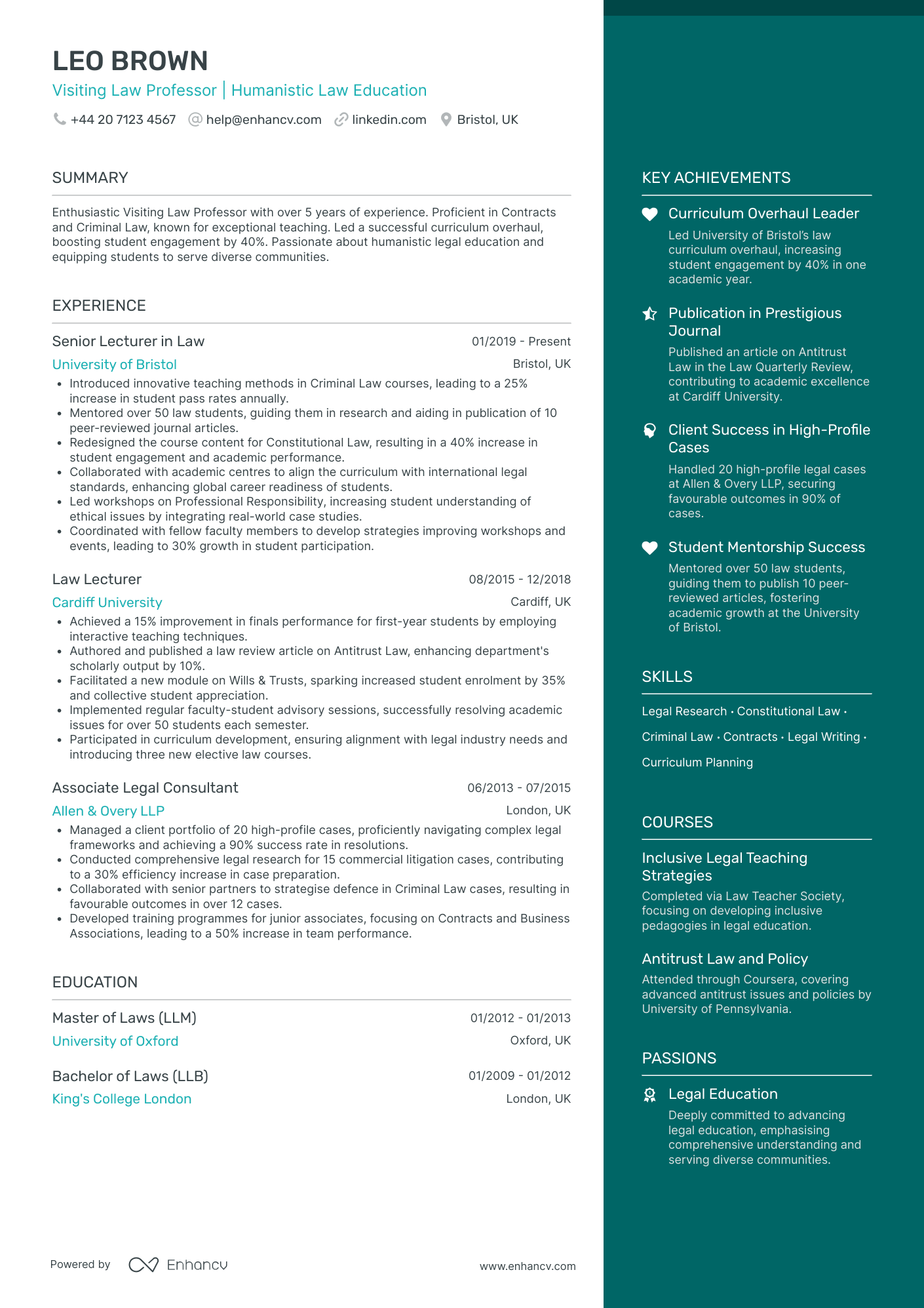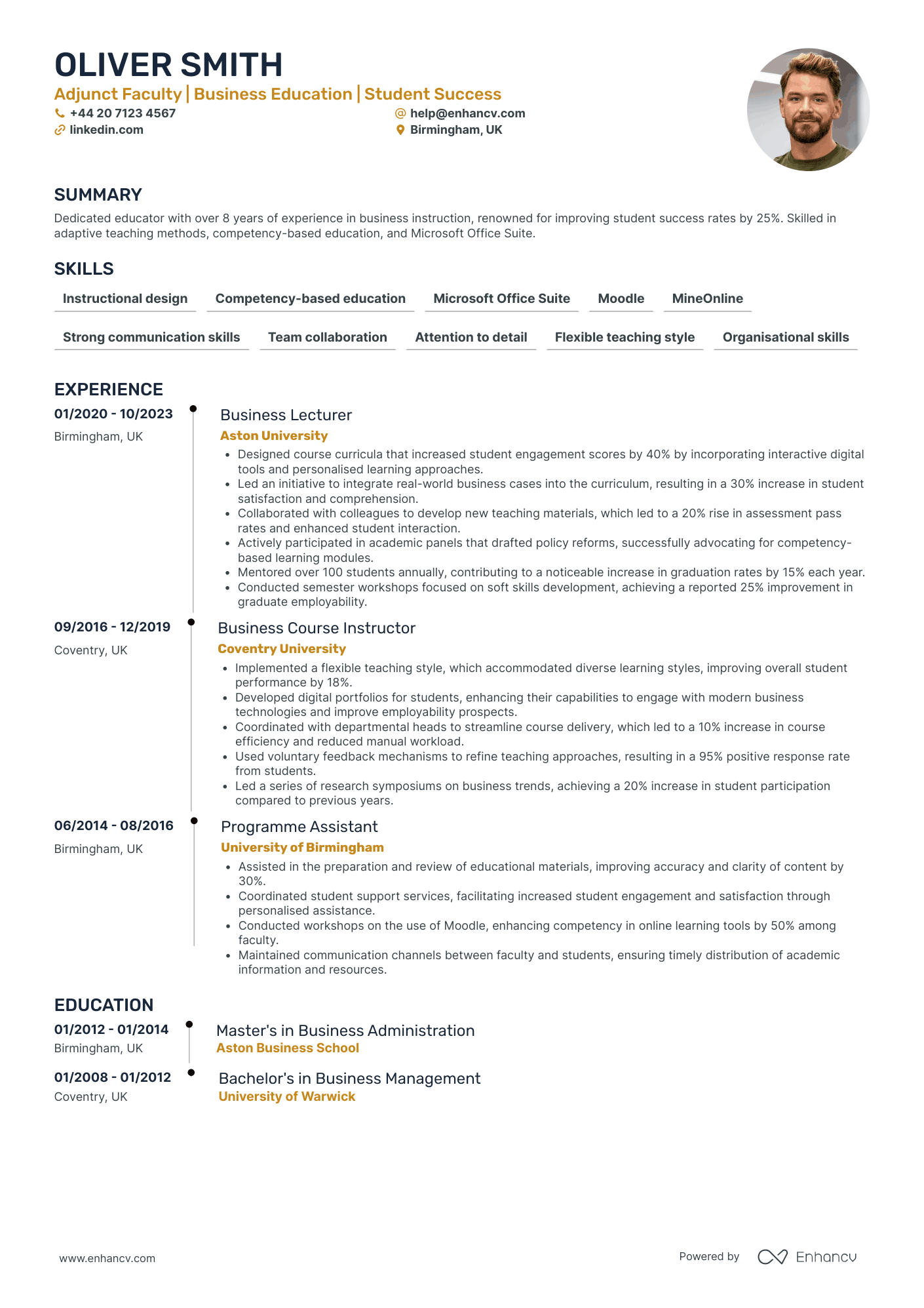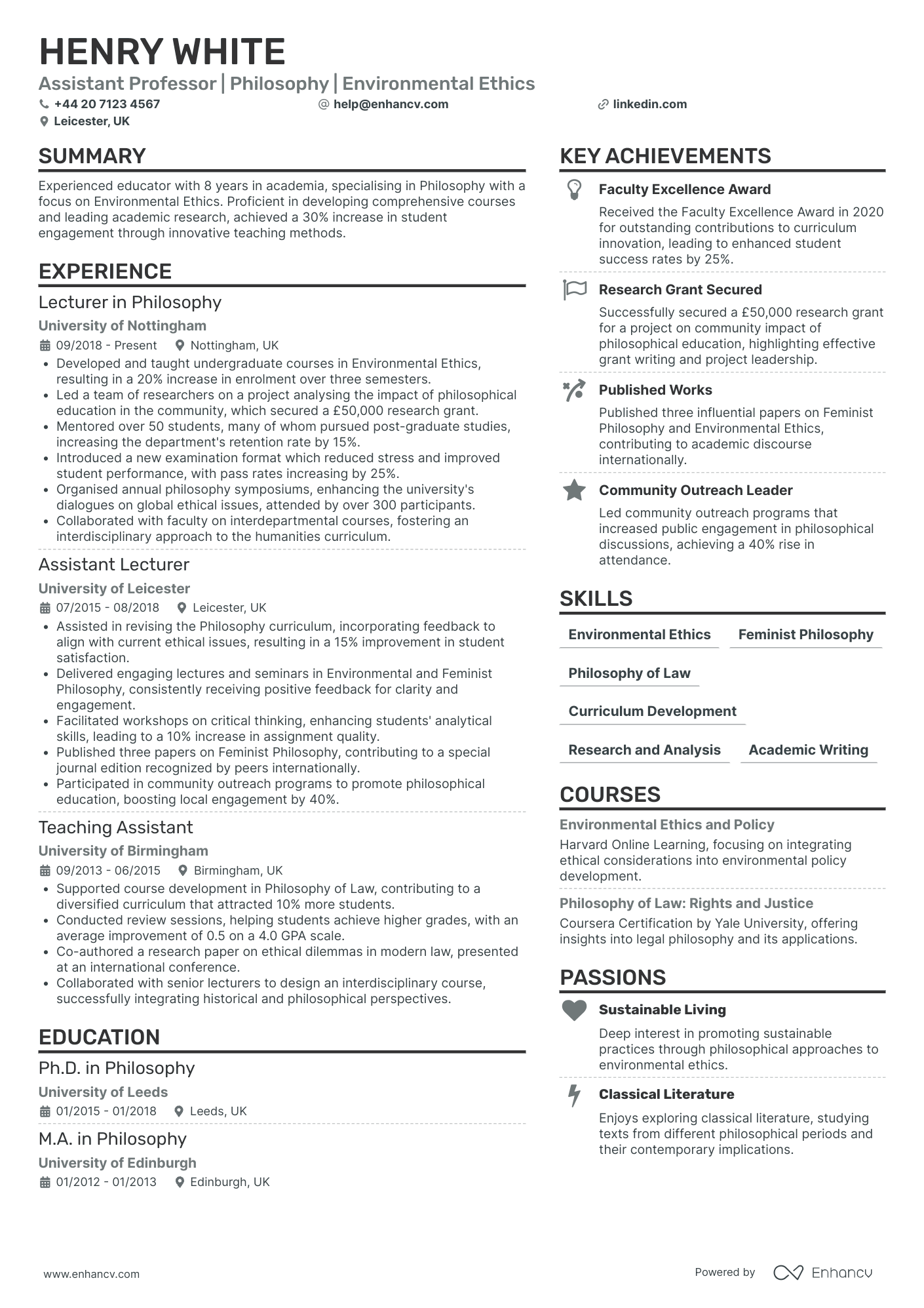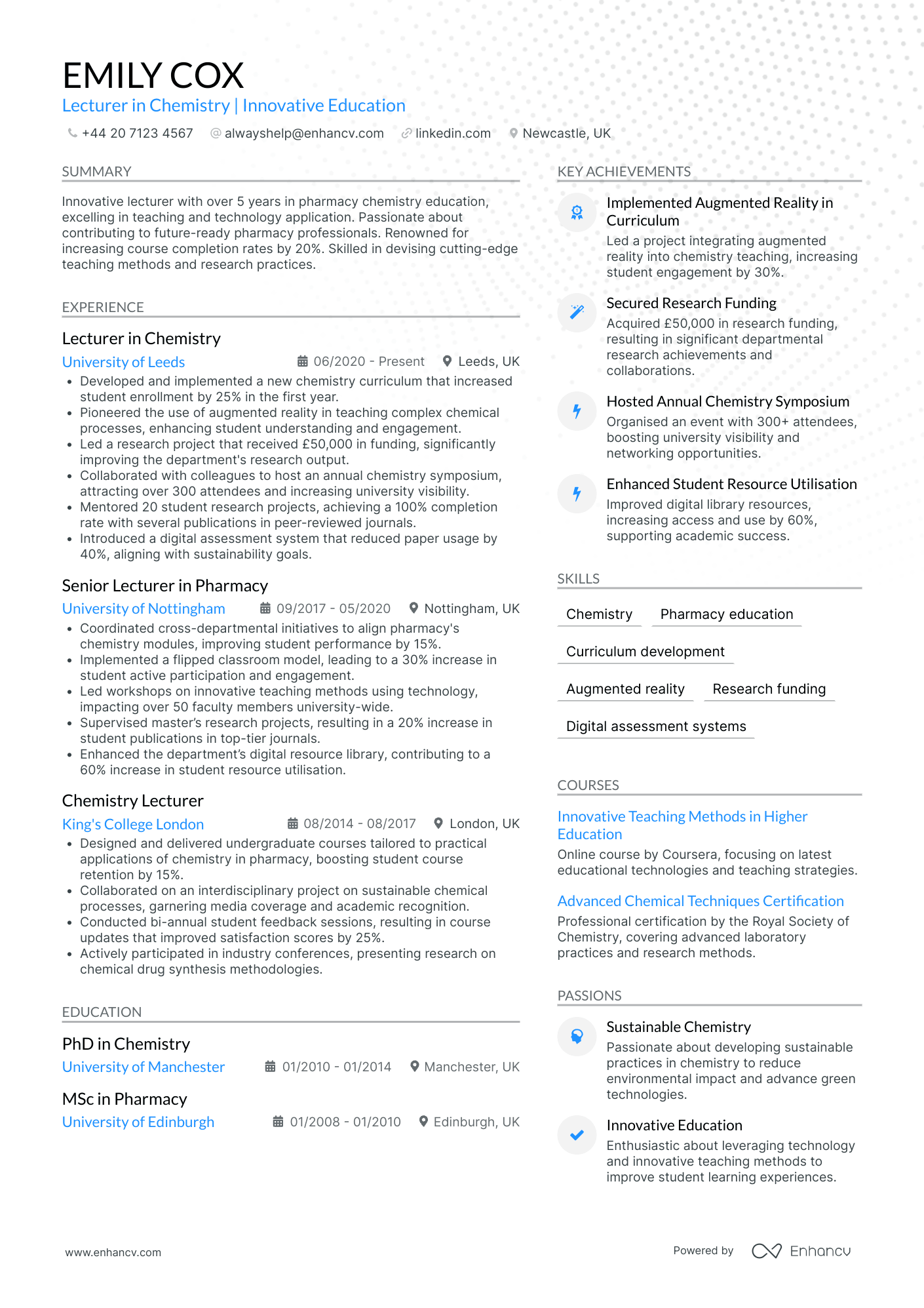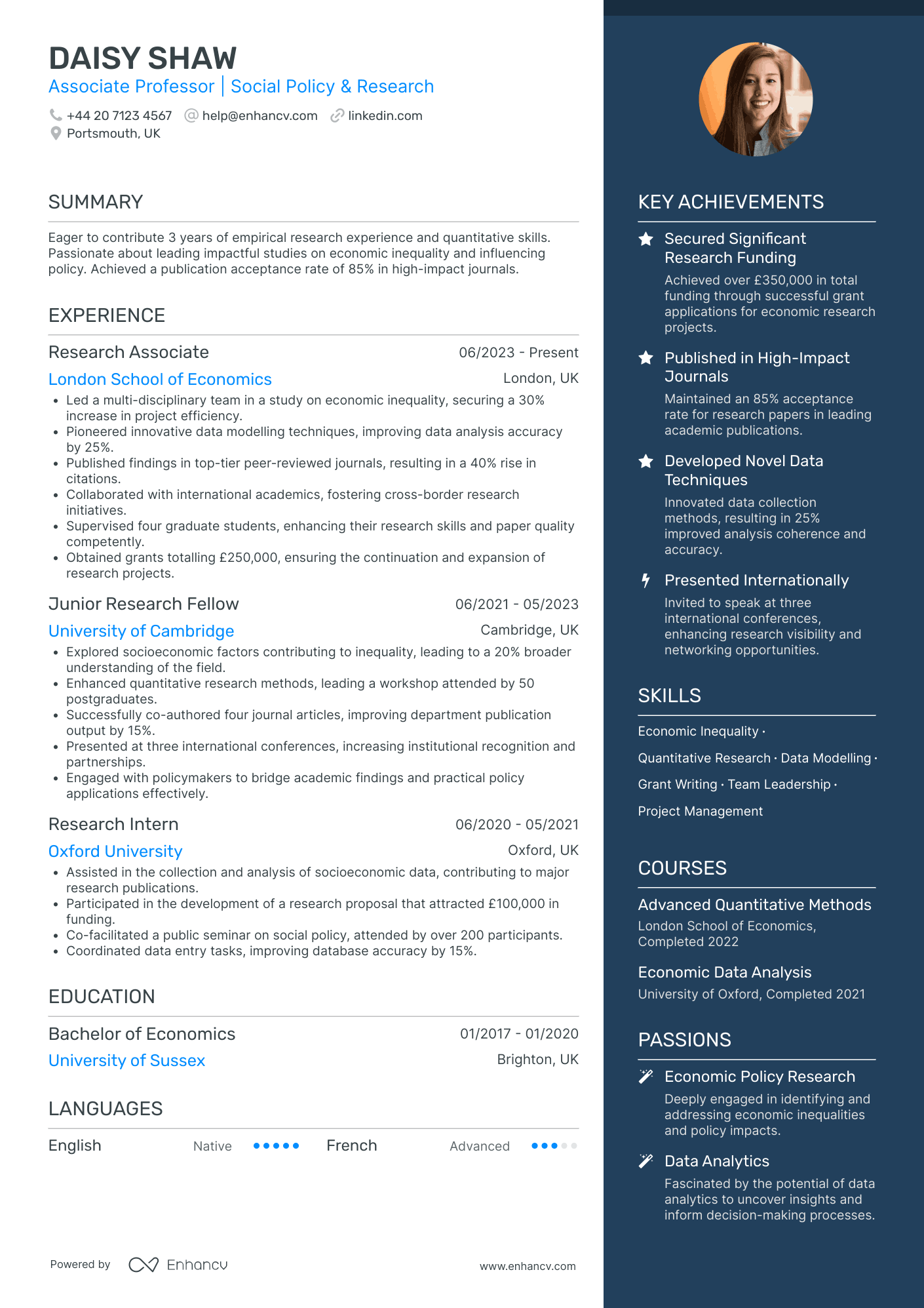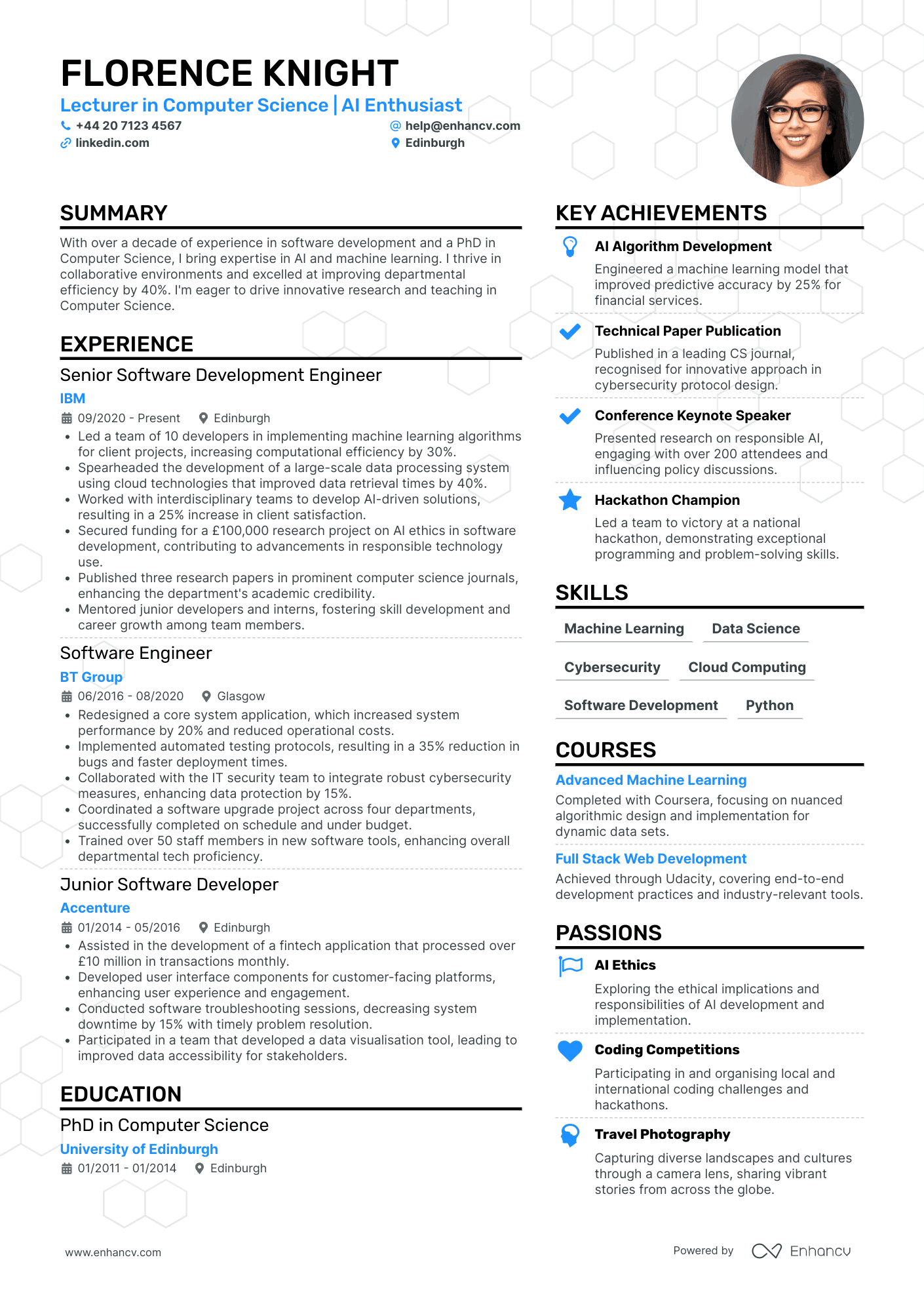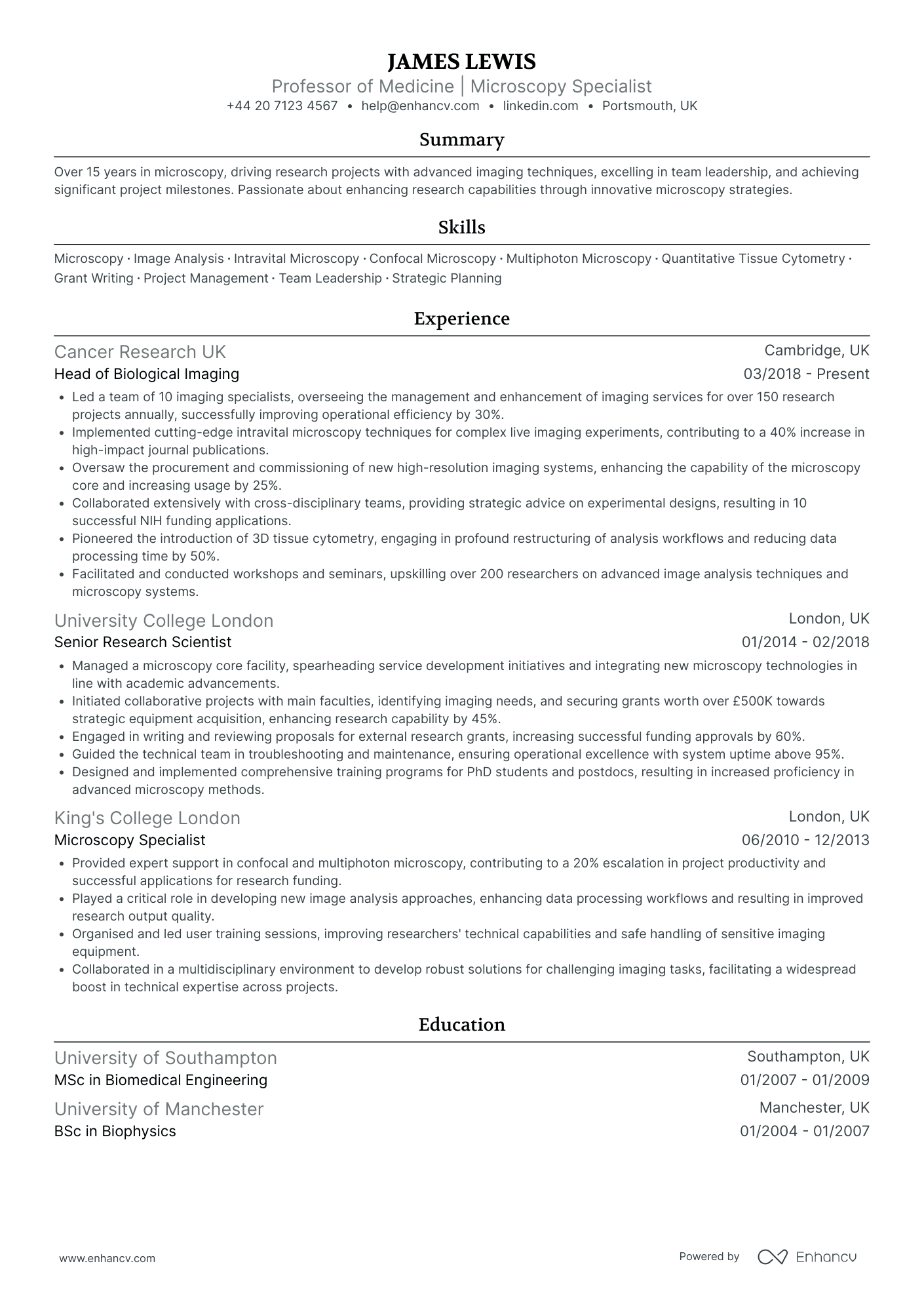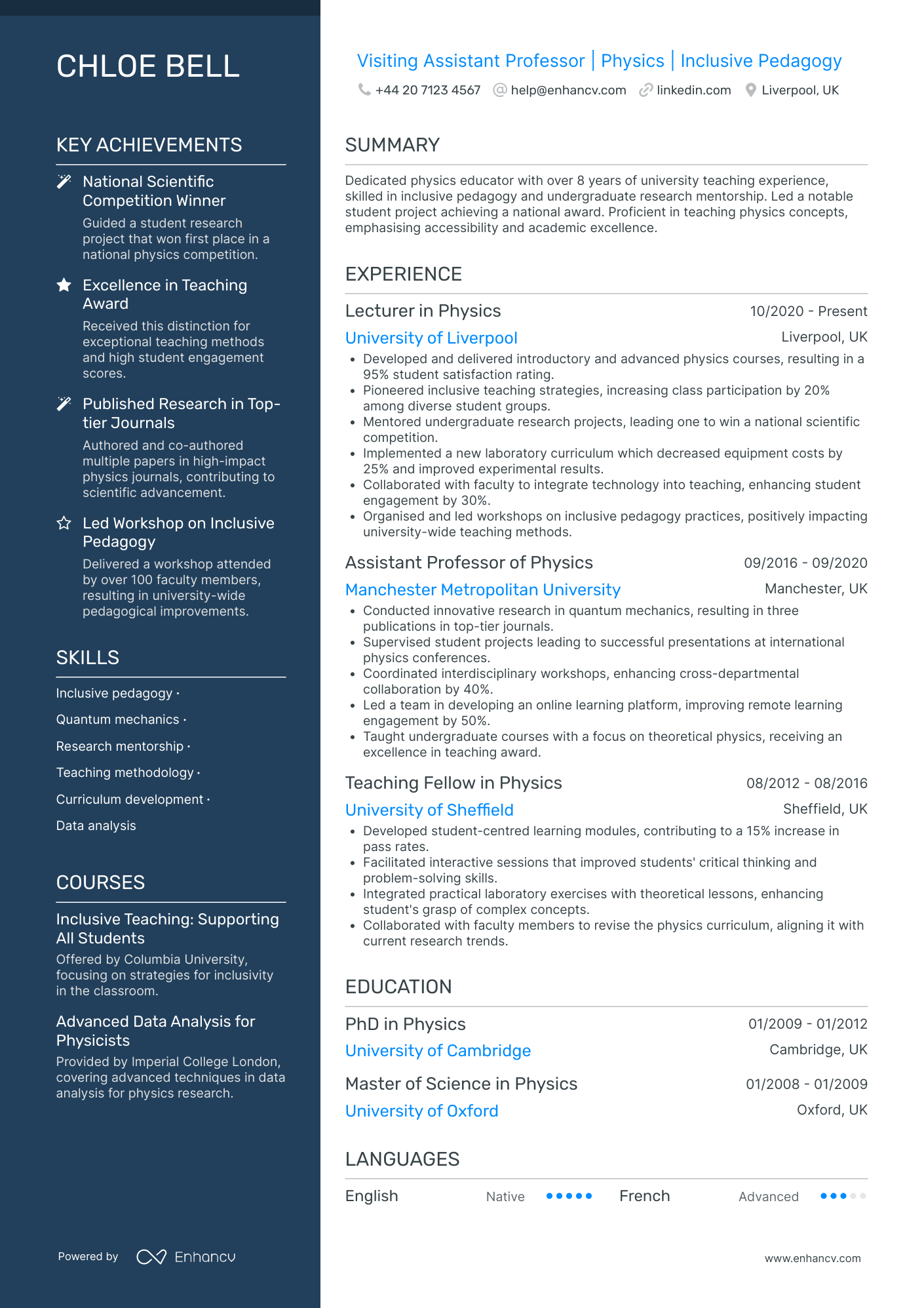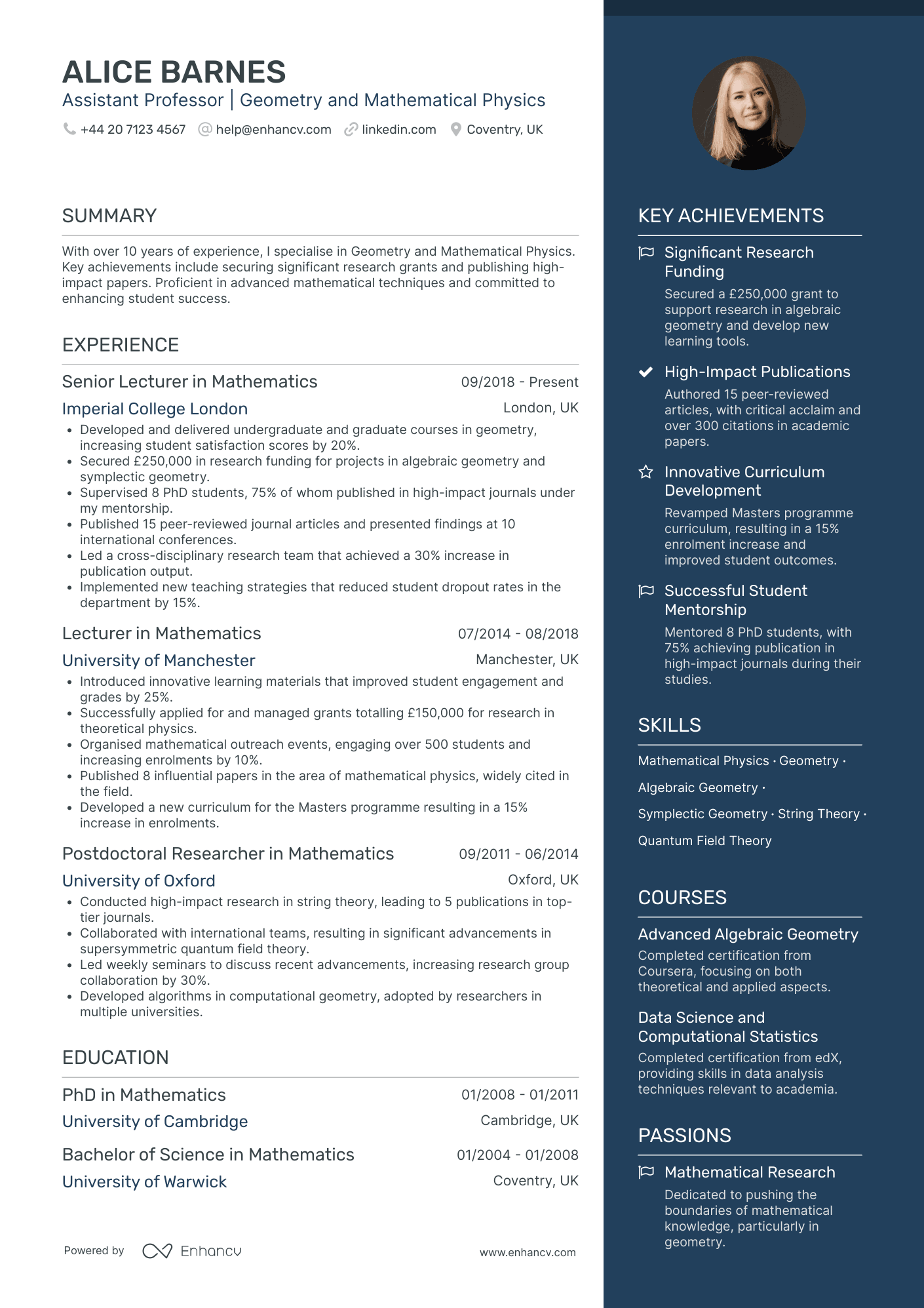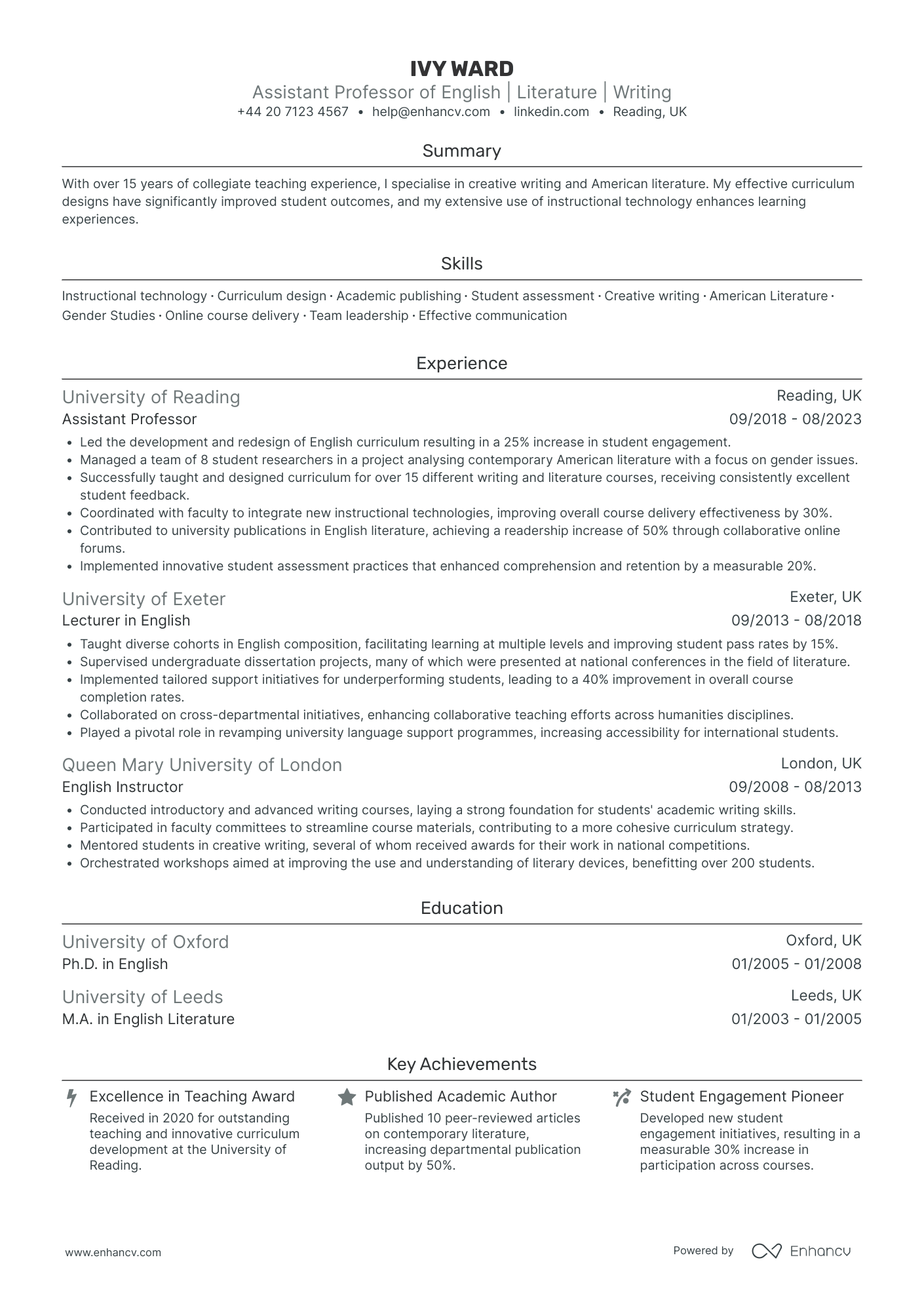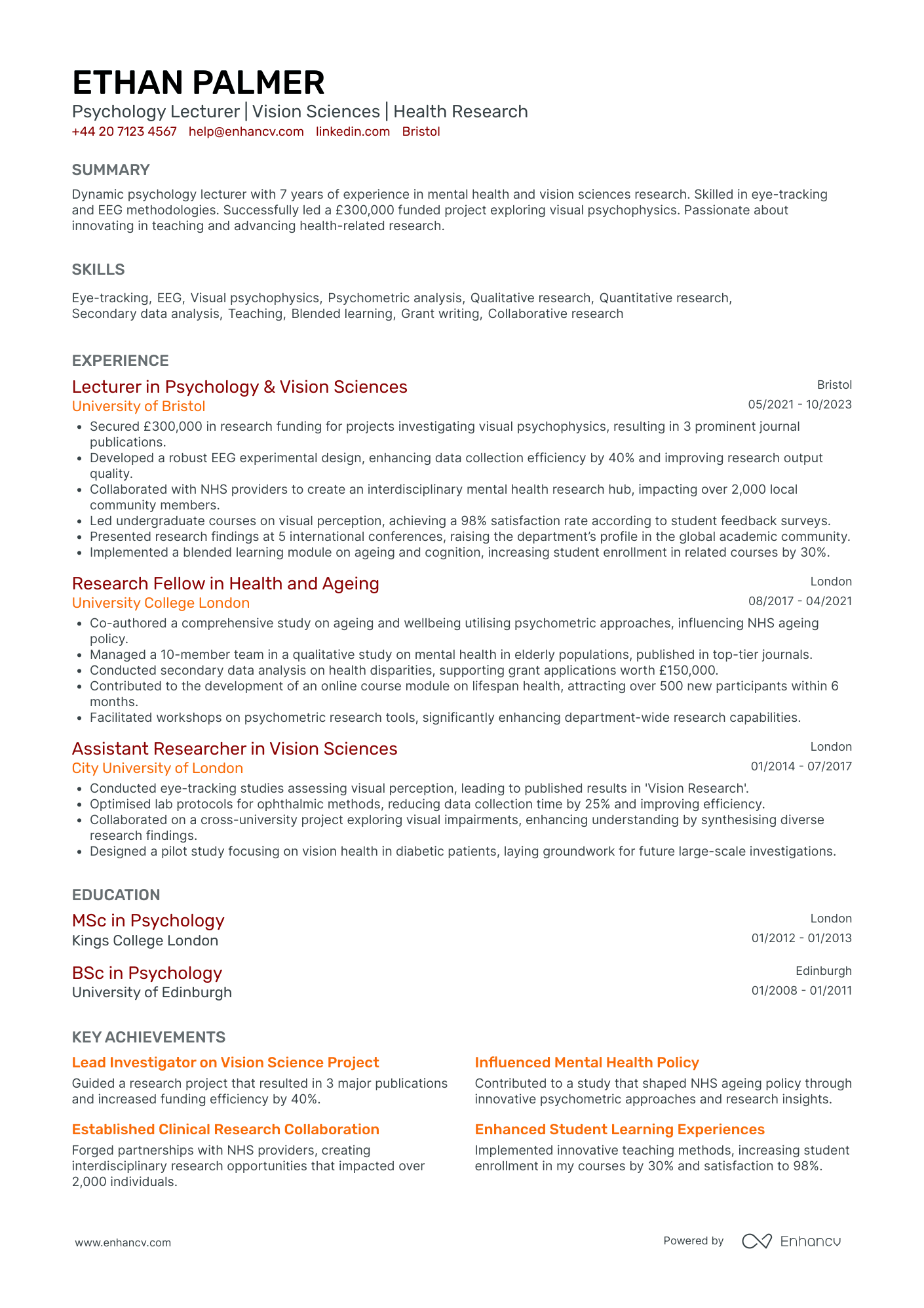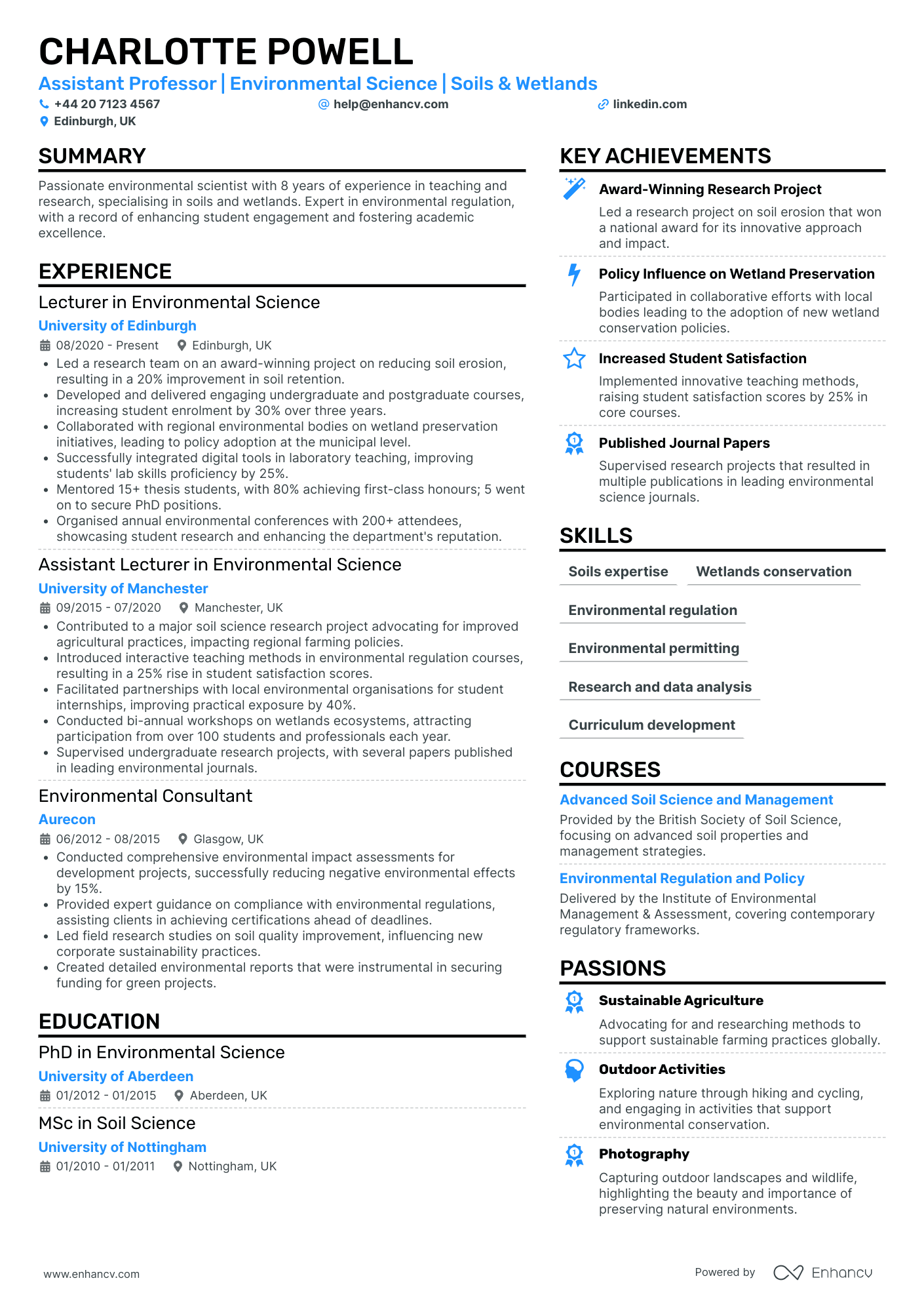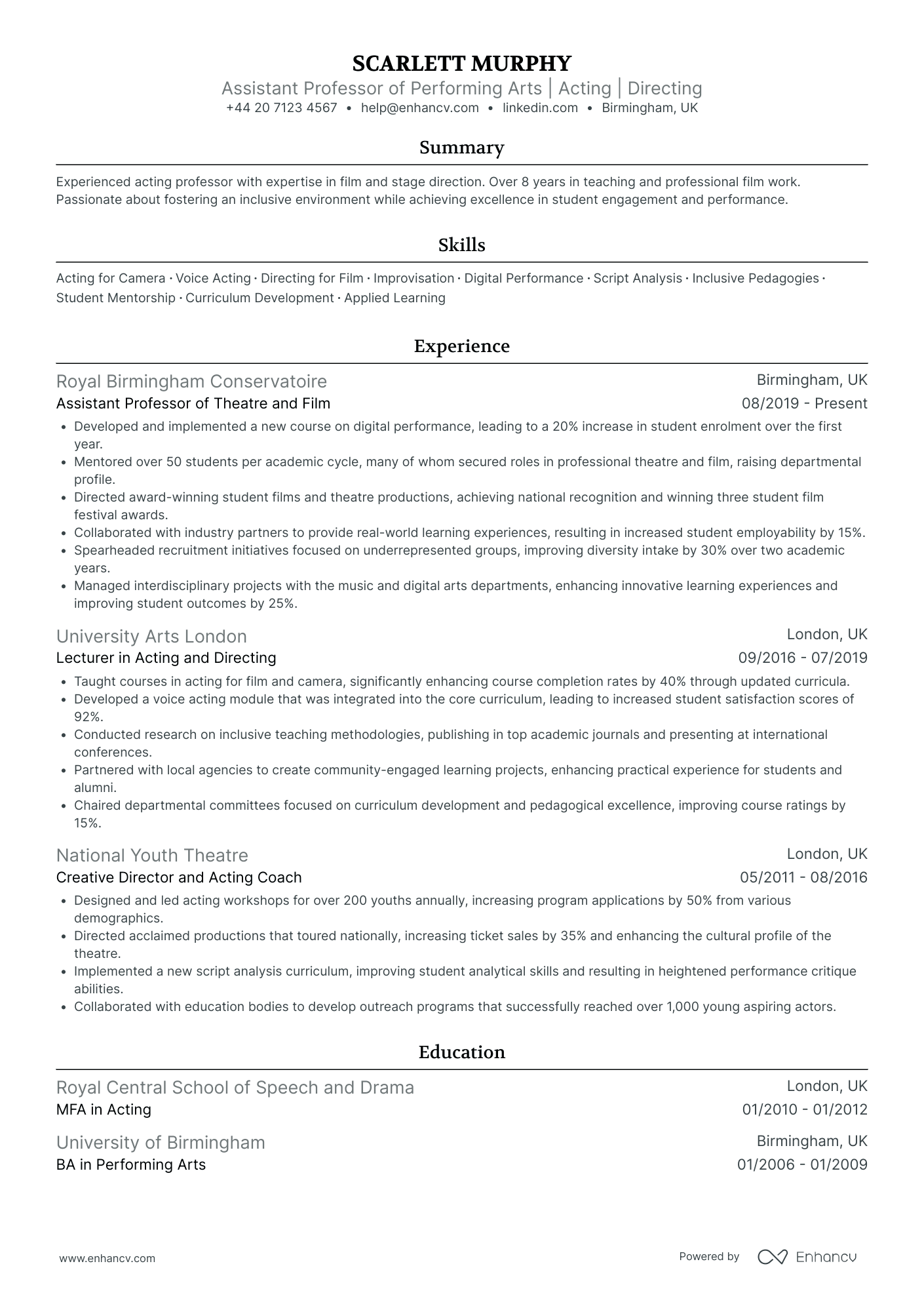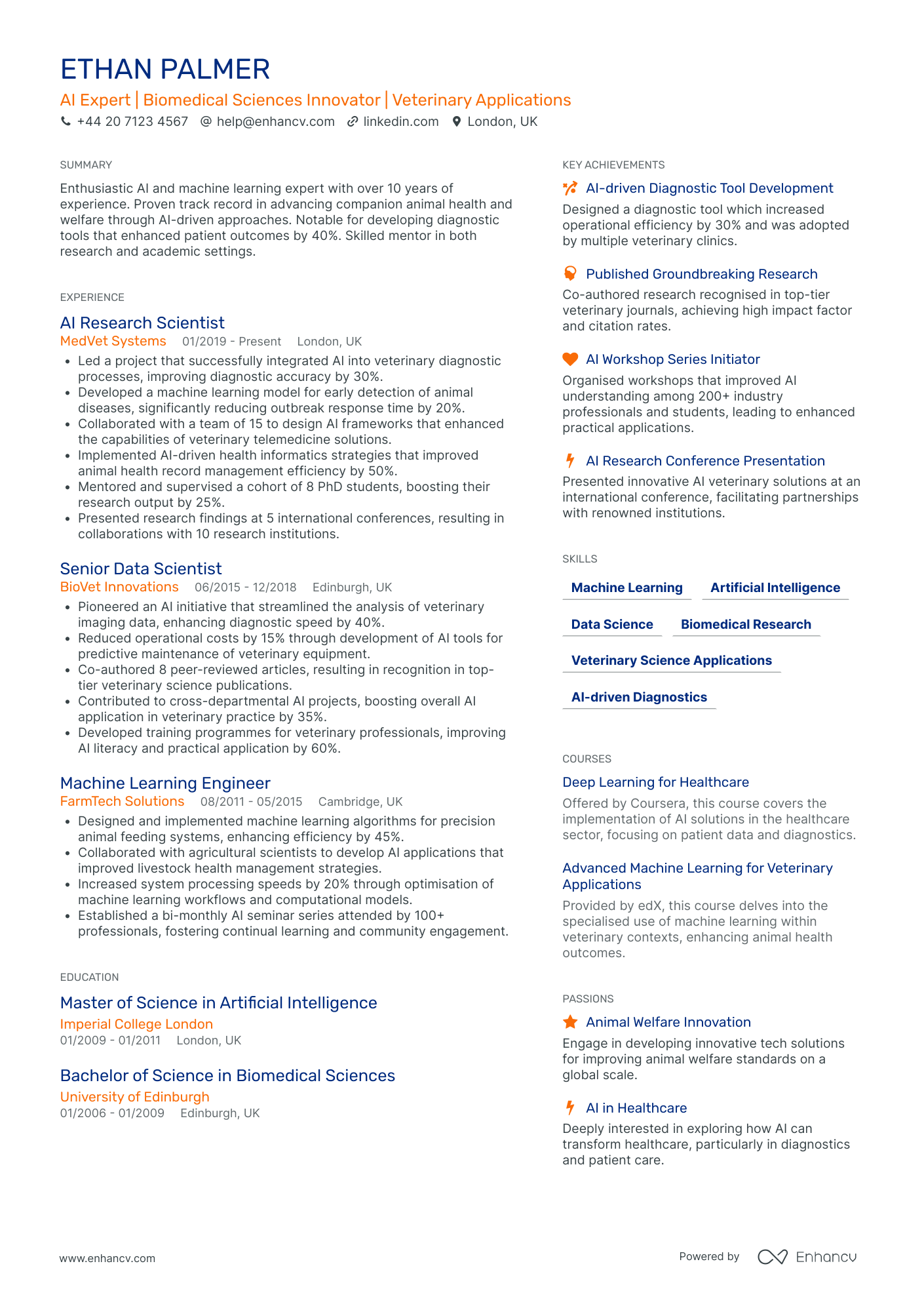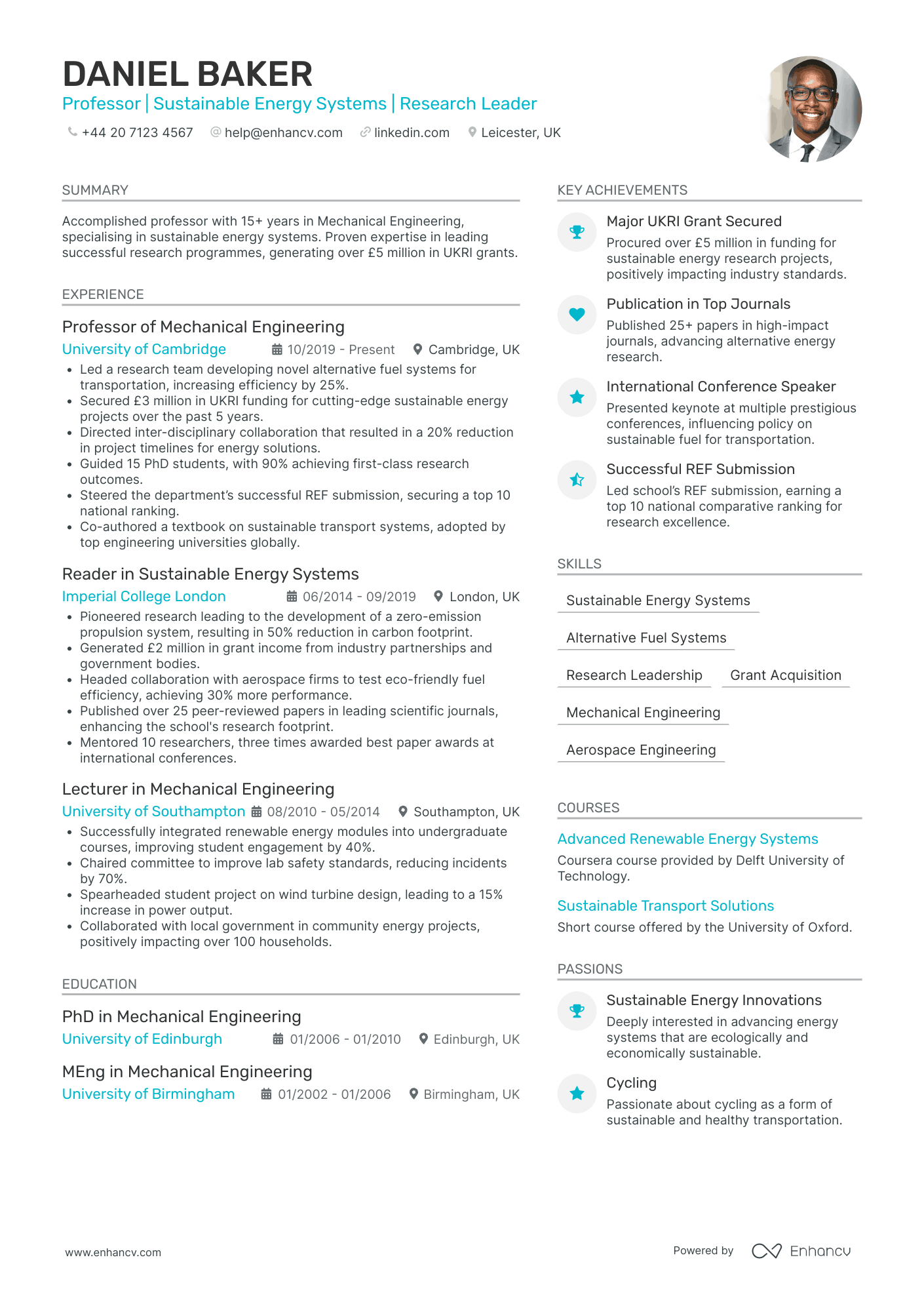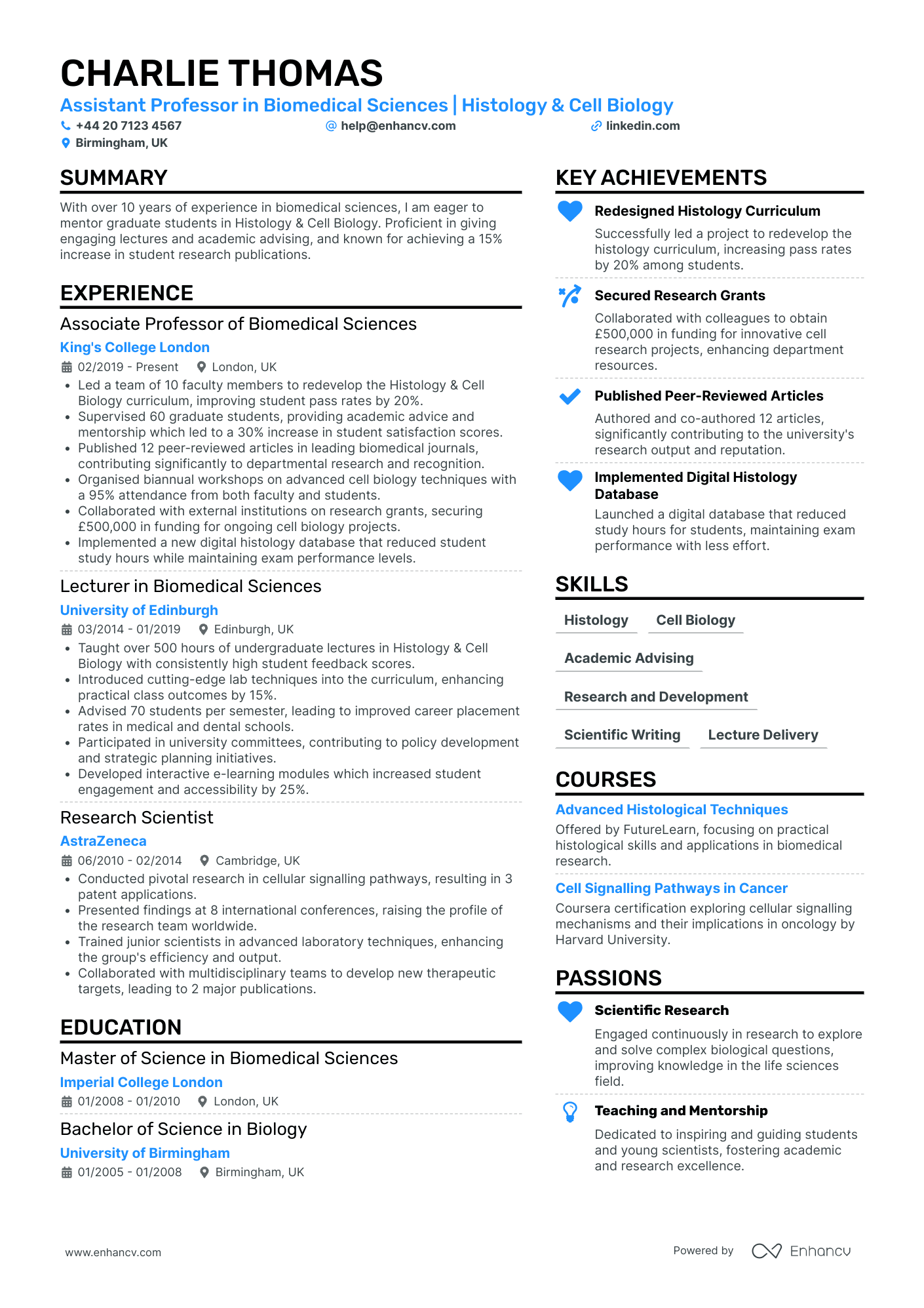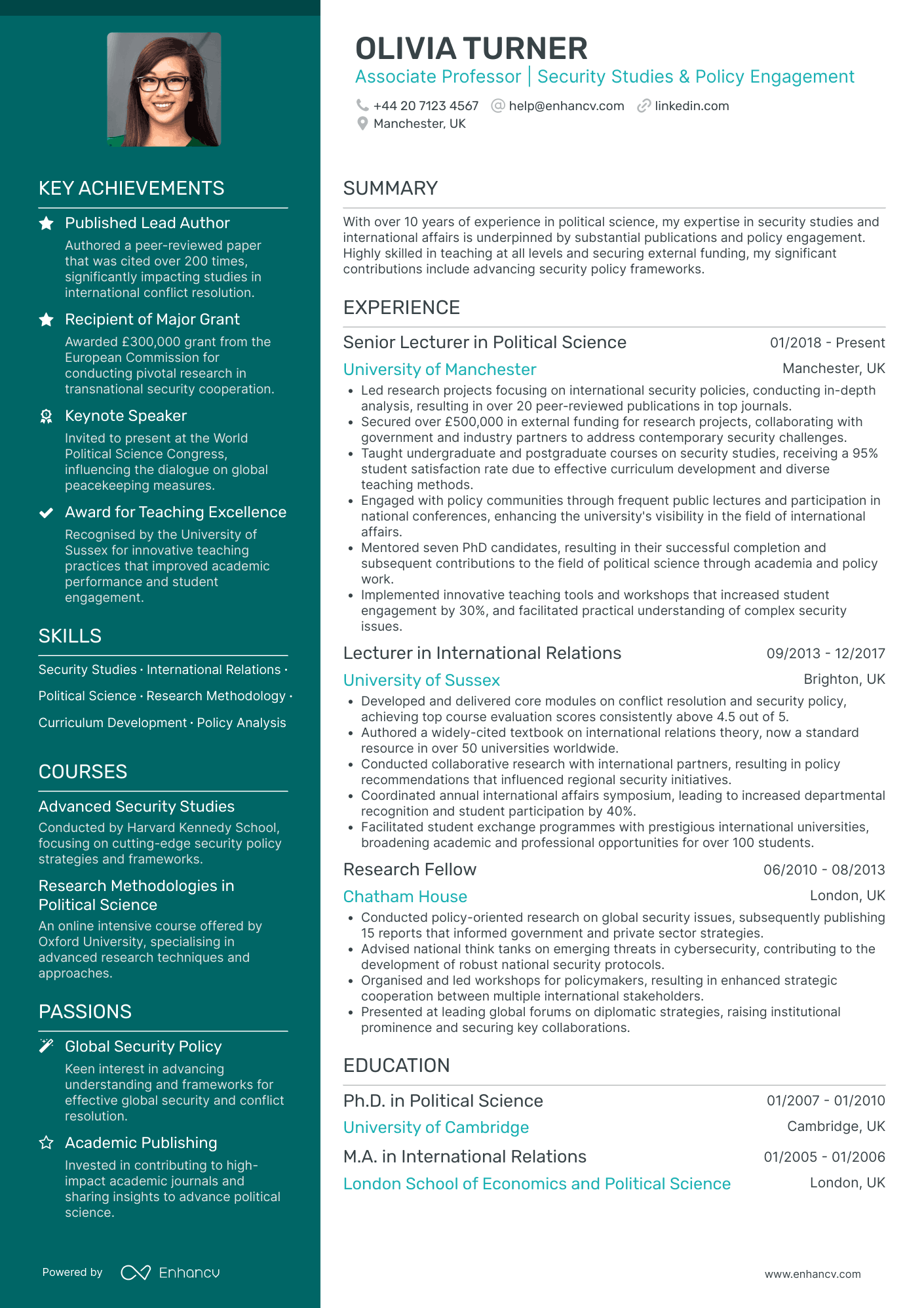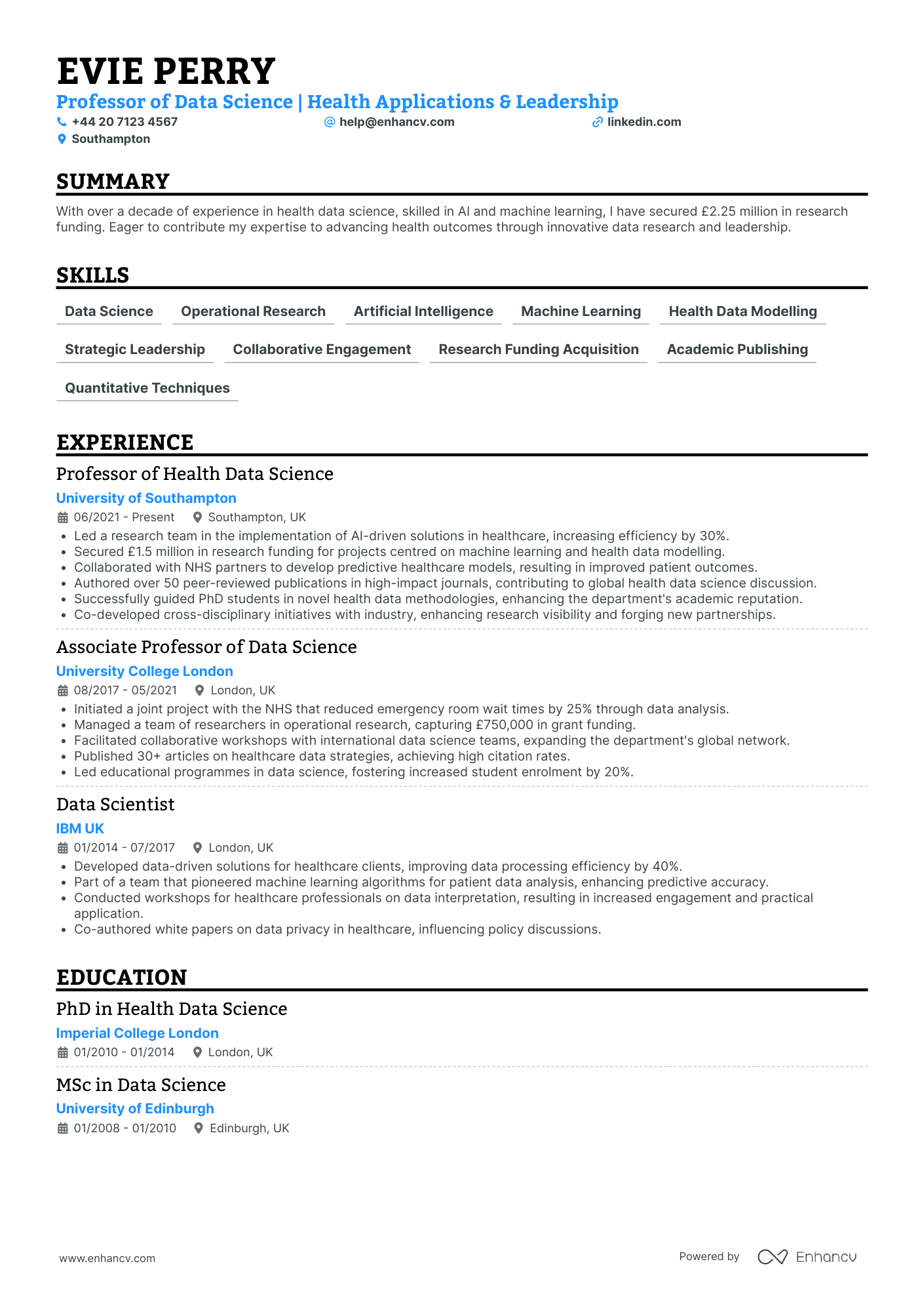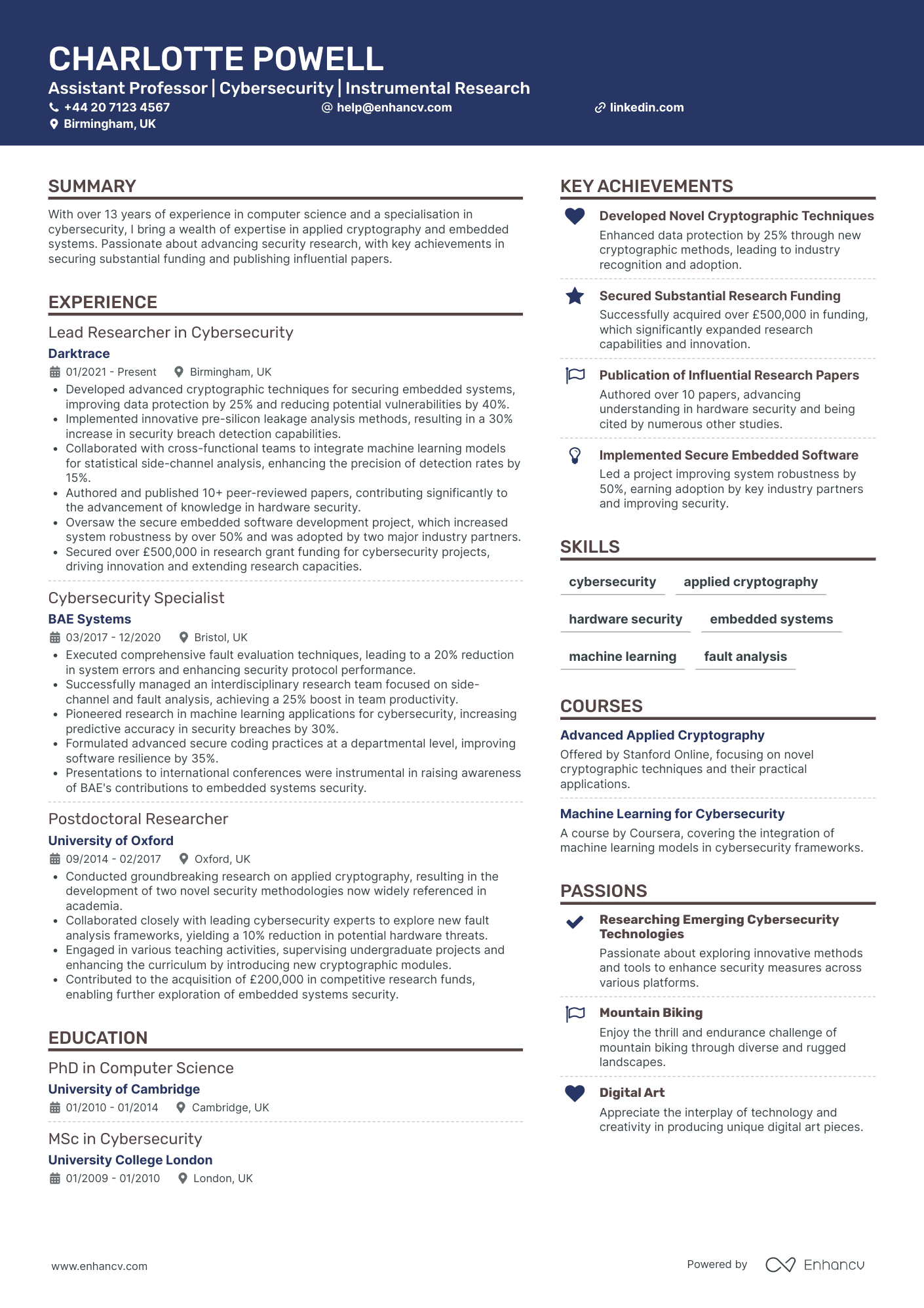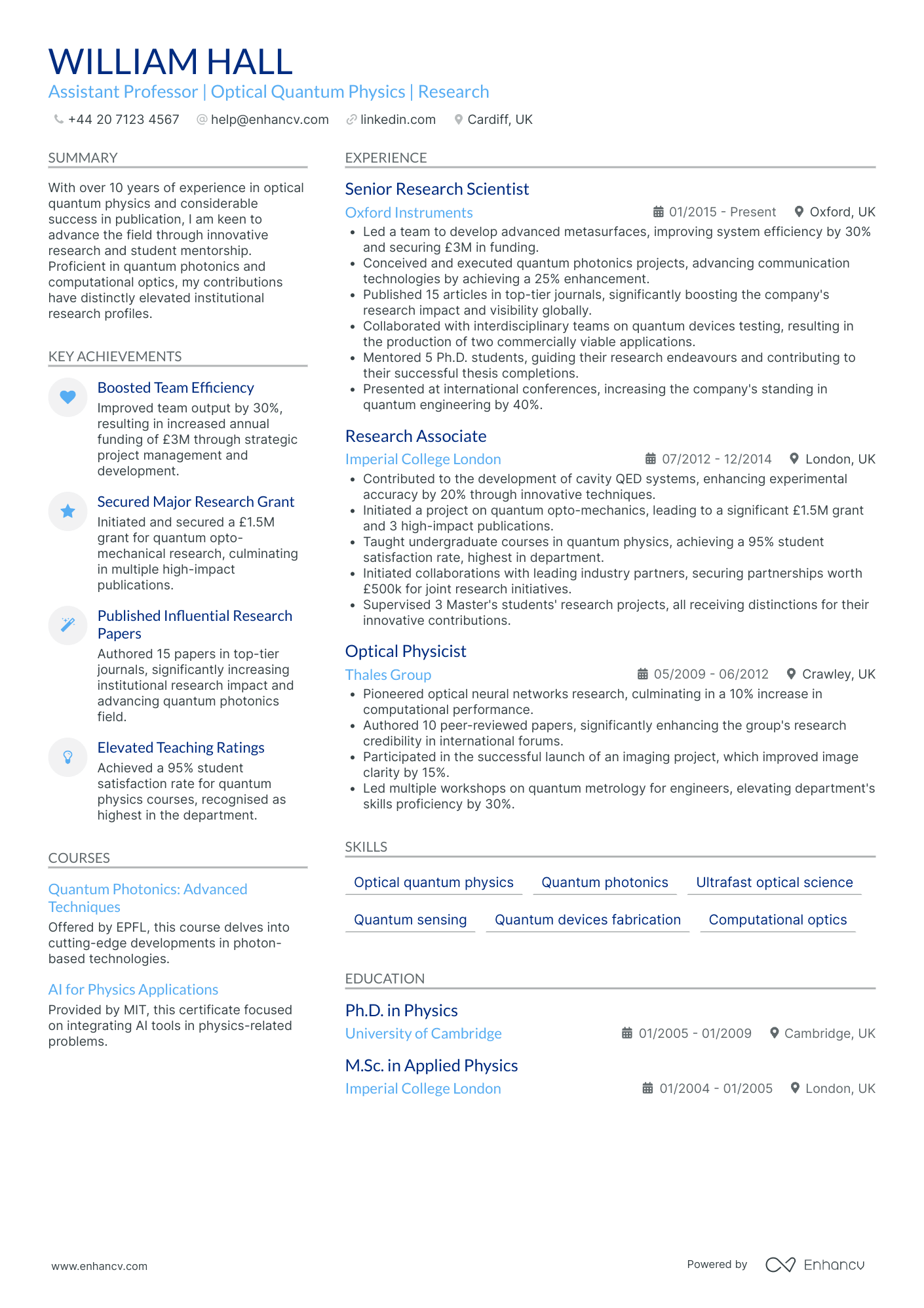Crafting a CV that effectively showcases a diverse range of research, teaching experiences, and publications can be daunting for any academic professional. By following our comprehensive guide, you'll receive tailored advice to present your scholarly achievements with clarity and impact, ensuring your CV stands out in competitive academic job markets.
- Applying best practices from real-world examples to ensure your profile always meets recruiters' expectations;
- What to include in your work experience section, apart from your past roles and responsibilities?
- Why are both hard and soft skills important for your application?
- How do you need to format your CV to pass the Applicant Tracker Software (ATS) assessment?
If you're writing your CV for a niche professor role, make sure to get some inspiration from professionals:
Resume examples for professor
By Experience
Visiting Professor in Law
- Structured presentation enhancing clarity - The CV is exceptionally well-organized, beginning with a clear summary that succinctly outlines the candidate's teaching and curriculum development expertise. Each section is laid out logically, making it easy to follow the candidate's career progression and accomplishments, resulting in an accessible and informative document.
- Diversified academic and practical background - Leo Brown's career trajectory exhibits significant growth from an Associate Legal Consultant to a Senior Lecturer and a Visiting Law Professor, highlighting a successful transition from legal practice to academia. This demonstrates not only upward mobility but also adaptability and a diverse skill set that is valuable in both fields.
- Innovative methodologies and impact in education - The CV emphasizes unique educational methodologies, such as introducing inclusive legal teaching strategies and innovative teaching methods, which led to a 25% increase in student pass rates. This focus on pedagogical advancements highlights a commitment to improving educational outcomes and adapting to contemporary teaching demands.
Adjunct Professor in Business Studies
- Structured and Focused Presentation - The CV is clearly structured, using concise bullet points that make information easy to digest. This organized approach highlights the candidate's achievements and expertise in business education, ensuring that their successes and qualifications are immediately apparent to readers.
- Consistent Career Growth - Oliver Smith demonstrates steady career progression with increasing responsibilities and leadership positions. Beginning as a Programme Assistant and advancing to a Business Lecturer, his trajectory reflects a strong commitment to education and improving student success rates, which aligns perfectly with his passion for student engagement.
- Rich in Education-Specific Methodologies - The inclusion of competency-based education strategies and the use of interactive digital tools showcase Oliver's commitment to modernizing business education. His focus on real-world cases and digital learning initiatives underscore a deep understanding of contemporary educational needs, setting him apart as an innovative educator.
Emeritus Professor of Philosophy
- Comprehensive Structure - The CV is well-organized with distinct sections that are easy to navigate. Each part, from education background to work experience, is clearly delineated, ensuring that the reader can quickly locate relevant information. This clarity aids in effectively communicating the candidate's qualifications and experience in a straightforward manner.
- Progressive Academic Career - Displaying a solid career trajectory from Teaching Assistant to Assistant Professor, the CV illustrates the candidate's upward mobility and growing expertise within academia. Each role signifies a step forward, showcasing dedication and career development in the field of Philosophy, particularly Environmental Ethics.
- Emphasis on Interdisciplinary Methods - The CV highlights the candidate's ability to blend different philosophical perspectives, such as Feminist Philosophy and Environmental Ethics, into their teaching and research methods. Such an interdisciplinary approach is crucial for addressing complex ethical issues and is essential in preparing students for multifaceted challenges in their studies and future careers.
Senior Professor in Chemistry
- Clear Progression and Leadership in Academia - Emily Cox's career trajectory is marked by logical progression, with each role showcasing her growing leadership and impact in academia. Starting as a Chemistry Lecturer at King's College London and working her way up to a Lecturer in Chemistry at the University of Leeds, Emily's career illustrates a consistent level of advancement and increased responsibility, reflecting dedication and competence in her field.
- Integration of Technology for Enhanced Education - A distinctive aspect of Emily's profile is her use of technology to innovate and enhance the educational experience. By pioneering augmented reality in teaching and digital assessments, she has not only improved learning outcomes but also contributed to sustainability. This focus aligns with contemporary educational trends emphasizing technology as a tool for engagement and efficiency.
- Cross-Disciplinary Influence and Networking - Emily's CV highlights her adaptability and ability to influence beyond her immediate department through cross-departmental initiatives and collaborations. Her role in organizing symposiums and workshops indicates strong networking skills and an eagerness to foster interdisciplinary dialogue, thereby enhancing her institution's visibility and reputation while supporting professional development for herself and her peers.
Junior Professor in Economics
- Structured and Precise Content Presentation - Daisy Shaw's CV excels in its clear and organized presentation, with a structured layout that encompasses all essential sections such as professional experience, education, skills, achievements, and more. Each section is concise yet informative, allowing for an easy overview of her qualifications and expertise in social policy and research.
- Progressive Career Trajectory - The career journey depicted in Daisy's CV demonstrates a clear upward trajectory, showcasing promotions from a Research Intern to a Research Associate. This progression highlights her growing responsibilities and the increasing depth of her contributions to economic inequality research, making a compelling case for her role as an Associate Professor.
- Significant Contributions and Achievements - The achievements section emphasizes Daisy's notable impact in her field, such as securing over £350,000 in research funding and publishing in high-impact journals with an acceptance rate of 85%. These accomplishments underscore her ability to make tangible contributions to the academic community, enhancing the relevance of her expertise to both her current institution and potential future projects.
By Role
Assistant Professor in Computer Science
- Structured and Clear Presentation - The CV is organized with a well-defined structure, placing key sections in logical order, which enhances readability. Each segment presents concise information, allowing quick identification of the candidate's strengths and experiences.
- Impressive Career Growth - Florence Knight shows a clear career trajectory, progressing from a Junior Software Developer to a Senior Software Development Engineer while maintaining relevance in academia as a Lecturer. This growth demonstrates both professional and academic effectiveness.
- Depth in AI and Machine Learning - The CV highlights a strong focus on AI and machine learning, illustrated through roles requiring advanced technical skills and projects that improve computational efficiency and client satisfaction. It provides insight into Florence's capability to apply complex methodologies to real-world scenarios.
Professor of Medicine
- Clear and Effective Content Presentation - The CV is structured in a coherent manner, with each section clearly defined and detailed concisely. This organization allows easy accessibility to James Lewis's key skills, experience, and achievements, conveying his qualifications without overwhelming the reader.
- Impressive Career Trajectory - James has demonstrated significant growth in his career, advancing from a Microscopy Specialist role to leading teams as the Head of Biological Imaging. This progression indicates a strong ability to take on increasing responsibilities and leadership in the field of medicine and microscopy.
- Emphasis on Unique Industry-Specific Elements - The CV highlights James's expertise in specialized microscopy techniques, such as intravital microscopy and 3D tissue cytometry, showcasing advanced technical knowledge and contribution to cutting-edge scientific research. His mastery of these tools is a key differentiator in his field.
Professor in Physics
- Content Presentation Excellence - The CV exhibits remarkable clarity and structure, ensuring that each section is well-organized and succinct. The use of bullet points effectively highlights key responsibilities and achievements, making it easy for readers to grasp the candidate's contributions and skills quickly.
- Career Trajectory and Professional Growth - Demonstrating a steady progression from Teaching Fellow to Visiting Assistant Professor, Chloe Bell’s career path reflects significant professional growth and increasing responsibilities. Her roles indicate a deepening expertise in physics education, alongside broadening involvement in curriculum development and pedagogical advancements.
- Emphasis on Inclusive Pedagogy - A unique element of this CV is the emphasis on inclusive pedagogy, which is highlighted through various roles and achievements. This focus not only sets the candidate apart in the physics education field but also showcases their commitment to accessibility and diversity in education, a key consideration in modern academia.
Associate Professor in Mathematics
- Impressive Career Trajectory - Alice Barnes has demonstrated a profound career progression from a Postdoctoral Researcher to a Senior Lecturer and now an Assistant Professor. This upward trajectory highlights her persistent professional development and growing leadership roles within prestigious institutions, indicating her capability to excel in highly competitive academic environments.
- Industry-Specific Expertise in Mathematical Physics - The CV showcases Alice's deep technical knowledge in specialized fields like algebraic geometry, symplectic geometry, and string theory. Her proficiency in these niche areas, coupled with certifications in advanced algebraic geometry and data science, sets her apart as an expert capable of contributing significant advancements to the field.
- Significant Achievements with Tangible Impact - Alice Barnes's accomplishments extend beyond quantitative metrics. Example achievements like securing substantial research funding, increasing student satisfaction, and reducing dropout rates demonstrate her ability to translate academic success into real-world impact, reinforcing her value to any academic institution.
Professor of English Literature
- Articulates educational background and continuous learning - The CV provides a clear trajectory in literature and English education through prestigious institutions, including a Ph.D. from the University of Oxford. It highlights ongoing development with additional courses in advanced teaching practices and digital communications, showcasing commitment to professional growth.
- Tracks a consistent career advancement - Ivy Ward’s career path demonstrates a steady progression from an English Instructor to Assistant Professor. This trajectory signifies dedication and competence, culminating in a role with substantial responsibility, such as curriculum development and managing research teams at the University of Reading.
- Highlights impactful curriculum and program development - The CV emphasizes achievements in enhancing educational content and delivery. Ivy led curriculum redesigns that increased student engagement, improved student retention rates through innovative assessment practices, and drove significant growth in departmental output and enrollment, showcasing a tangible impact on the institution's academic standing.
Professor of Clinical Psychology
- Structured for Clarity and Engagement - The CV stands out with its clear and well-structured presentation, providing an easy-to-follow narrative of the candidate's journey from academia to impactful research projects. The use of bullet points for achievements ensures that key accomplishments are highlighted succinctly and can be quickly grasped by the reader.
- Focus on Interdisciplinary Growth - Ethan Palmer’s career trajectory showcases significant growth, particularly evident in the transition from Assistant Researcher to Lecturer. This progression highlights his ability to leverage his technical skills and research insights to assume more influential roles, expanding his impact through interdisciplinary collaboration in psychology and vision sciences.
- Depth in Specialized Research Methods - The CV reveals a strong command of industry-specific methodologies, such as eye-tracking and EEG, underscoring Palmer’s technical acumen. His experience in leading projects that employ these tools not only underlines his expertise but also positions him as a thought leader in the fields of psychology and vision science research.
Professor of Environmental Science
- Structured Content Presentation - The CV is structured with clarity and conciseness, making it easy to navigate through important details. Each section is well-organized, starting from the summary, which captures the professional essence of Charlotte Powell, through to detailed descriptions of her experience, education, and skills, ensuring all necessary information is readily accessible.
- Distinct Career Trajectory - Charlotte Powell's career progression showcases a clear trajectory of growth and advancement in the field of environmental science. Beginning as an environmental consultant, she transitioned into academia, moving from an assistant lecturer to a lecturer, and now serves as an assistant professor. Each role reflects a deepening of expertise and responsibility within the industry.
- Specific Industry Achievements - The CV highlights industry-specific accomplishments, such as implementing soil erosion research that led to a significant improvement in soil retention, influencing wetland preservation policies, and receiving national awards for innovative research projects. These achievements underscore her ability to drive meaningful environmental impact and influence policy and practice.
Professor of Performing Arts
- Clear Career Progression - Scarlett Murphy's career trajectory illustrates consistent growth, starting as a Creative Director and Acting Coach and progressing to an Assistant Professor role. Each position reflects an increasing level of responsibility and influence in the performing arts industry, showcasing her commitment to professional development.
- Impressive Achievements with Impact - The CV highlights numerous achievements with significant impact, such as award-winning student films and successful recruitment campaigns for underrepresented groups, illustrating Murphy’s ability to create change and drive progress within educational settings.
- Interdisciplinary Project Management - Murphy demonstrates adaptability and cross-functional experience through her management of interdisciplinary projects with music and digital arts departments, indicating versatility in creating innovative learning experiences that enhance student outcomes.
Professor of Veterinary Medicine
- Comprehensive and Structured Content Presentation - The CV is meticulously organized, presenting a well-rounded profile that is both easy to read and impactful. Each section is clear and concise, focusing on relevant achievements and roles while avoiding unnecessary jargon. This structured approach ensures that the candidate's qualifications and experiences are communicated effectively.
- Significant Career Growth and Diversified Experience - Ethan Palmer's career trajectory illustrates significant growth and adaptability. Starting as a Machine Learning Engineer, progressing to a Senior Data Scientist, and currently an AI Research Scientist, the CV reflects a focused career progression with increasing responsibilities and a transition from broader tech roles to specialized biomedical and veterinary applications.
- Cross-disciplinary Methodological Expertise - The CV showcases a deep technical understanding of AI and data science, particularly in veterinary and biomedical contexts, by emphasizing unique methodologies like AI-driven diagnostics and health informatics strategies. This specialized knowledge underlines the candidate's capability to develop tailored solutions that address complex challenges in animal health and welfare.
Professor of Aerospace Engineering
- Clear and Structured Presentation - The CV is well-organized, combining clarity and conciseness to effectively relay Daniel Baker's career highlights. Each section is thoughtfully categorized, allowing the reader to easily digest information about his impressive academic and professional milestones.
- Significant Career Growth - Daniel's progression from Lecturer to Professor showcases a robust career trajectory. His promotions speak to growing responsibilities and recognition within top-tier universities, reflecting his consistent contribution and leadership in the field of sustainable energy systems.
- Technical Depth in Sustainable Energy - The CV emphasizes unique industry-specific methodologies such as alternative fuel systems and zero-emission propulsion, demonstrating Daniel's deep technical expertise. His ability to lead research that impacts energy efficiency and sustainability underscores his value in advancing industry standards.
Professor of Biomedical Sciences
- Clear Structure and Concise Presentation - The CV is organized in a logical, easy-to-follow format that clearly delineates sections such as experience, education, and achievements. Information is presented concisely, ensuring that key accomplishments and skills are highlighted without overwhelming the reader.
- Progressive Career Trajectory - The career path shows significant upward mobility, progressing from a Research Scientist to an Associate Professor. This indicates a strong recognition of expertise and leadership within the field of biomedical sciences, showcasing growth in both academic and practical settings.
- Industry-Specific Achievements and Impact - The CV includes specific contributions to the field of biomedical sciences, such as securing substantial research funding and enhancing the histology curriculum. These achievements not only demonstrate technical proficiency but also illustrate the candidate's impact on educational outcomes and departmental success.
Professor of Political Science
- Clear and Cohesive Structure - The CV is well-organized with distinct sections that include a header, summary, detailed experience, education, skills, achievements, and passions. This clarity ensures that each aspect of Olivia's professional journey is easy to navigate and understand, with concise language that highlights key points in each section.
- Impressive Career Growth and Industry Influence - Olivia's career demonstrates a consistent upward trajectory, starting from a Research Fellow role and advancing to a Senior Lecturer and now an Associate Professor. Her progressive roles reflect her growing influence in the field of security studies and her commitment to impacting security policy on an international scale.
- Significant Contributions and Impactful Publications - The CV highlights Olivia's expertise through her extensive publications, including over 20 peer-reviewed articles and a widely-cited textbook. These achievements underscore her authority in security studies and her ability to influence both academic and policy-making circles, which is crucial for her role in political science.
Professor of Data Science
- Strategic Leadership and Industry Collaboration - Evie Perry's CV highlights her leadership skills and ability to build collaborative partnerships. Her role as a professor involved working closely with NHS partners and running international workshops, demonstrating her capacity to leverage cross-industry relations to drive innovative research and health data solutions effectively.
- Quantitative Achievements with Tangible Impact - The CV extensively details Perry’s achievements in securing significant research funding (£2.25 million) and enhancing operational efficiency (30% in healthcare). These not only showcase her ability to attain critical resources but also underscore the practical impact of her work, such as improved patient outcomes and reduced emergency wait times.
- Technical Expertise in Health Applications - The CV effectively presents Evie Perry as a subject-matter expert in health data science, highlighting her work with AI, machine learning, and data solutions tailored to healthcare needs. Her direct involvement in developing predictive models and conducting workshops for healthcare professionals positions her as a thought leader in applying advanced data methodologies to improve health services.
Professor of Cybersecurity
- Comprehensive career trajectory - Charlotte Powell's career path showcases a strong progression from a Postdoctoral Researcher to key industry roles, culminating in her current position as an Assistant Professor. Each step is marked by increased responsibility and notable impact, evident in her transition from academic research to applied industry roles at reputable firms like Darktrace and BAE Systems.
- Depth in cybersecurity methodologies - The CV highlights Charlotte's proficiency in advanced cybersecurity methodologies, particularly in cryptographic techniques and side-channel analysis. Her ability to integrate machine learning into these processes showcases her unique technical depth and forward-thinking approach that is critical in addressing modern cybersecurity challenges.
- Achievements with significant industry impact - The CV details Charlotte's achievements not only in terms of metrics, such as a 30% increase in security breach detection capabilities, but also in industry adoption and recognition of developed technologies. Her achievements demonstrate a strong capacity to influence industry norms and contribute fundamentally to the advancement of cybersecurity practices.
Professor of Quantum Physics
- Effective Content Structure - The CV is organized in a manner that allows for quick comprehension of William Hall's qualifications and achievements. Each section is clearly delineated, with concise bullet points that articulate his responsibilities and accomplishments, making it easy for the reader to quickly grasp his expertise and career progression.
- Exemplary Career Progression - William's career trajectory demonstrates substantial growth, with advancements from an Optical Physicist at Thales Group, through a Research Associate at Imperial College London, to a Senior Research Scientist at Oxford Instruments. This reflects his upward mobility and increasing levels of responsibility in the field of optical quantum physics.
- Depth in Technical Expertise - The CV highlights William's profound technical knowledge, illustrated by his work on advanced metasurfaces and quantum photonics projects. His proficiency in cutting-edge methodologies like cavity QED systems and optical neural networks underscores his technical depth and his contributions to advancing communication technologies.
How to ensure your profile stands out with your professor CV format
It's sort of a Catch 22. You want your professor CV to stand out amongst a pile of candidate profiles, yet you don't want it to be too over the top that it's unreadable. Where is the perfect balance between your CV format simple, while using it to shift the focus to what matters most. That is - your expertise. When creating your professor CV:
- list your experience in the reverse chronological order - starting with your latest roles;
- include a header with your professional contact information and - optionally - your photograph;
- organise vital and relevant CV sections - e.g. your experience, skills, summary/ objective, education - closer to the top;
- use no more than two pages to illustrate your professional expertise;
- format your information using plenty of white space and standard (2.54 cm) margins, with colours to accent key information.
Once you've completed your information, export your professor CV in PDF, as this format is more likely to stay intact when read by the Applicant Tracker System or the ATS. A few words of advice about the ATS - or the software used to assess your profile:
- Generic fonts, e.g. Arial and Times New Roman, are ATS-compliant, yet many candidates stick with these safe choices. Ensure your CV stands out by using a more modern, and simple, fonts like Lato, Exo 2, Volkhov;
- All serif and sans-serif fonts are ATS-friendly. Avoid the likes of fancy decorative or script typography, as this may render your information to be illegible;
- Both single- and double-column formatted CVs could be assessed by the ATS;
- Integrating simple infographics, icons, and charts across your CV won't hurt your chances during the ATS assessment.
PRO TIP
Incorporate a touch of colour in headers or section breaks, but keep it professional and ensure it doesn’t detract from readability, especially in more conservative industries.
The top sections on a professor CV
- Academic qualifications are listed to show educational background and expertise.
- Research experience is detailed to highlight scholarly contributions and focus areas.
- Publications and presentations are included to demonstrate scholarly impact and engagement.
- Teaching experience is outlined to showcase instructional roles and pedagogical skills.
- Professional affiliations are mentioned to indicate involvement and recognition in academic communities.
What recruiters value on your CV:
- Highlight your academic qualifications and research contributions, focusing on your doctoral degree, post-doctoral research, and any significant publications or projects that underline your expertise in the field.
- Detail your teaching experience, including courses taught, innovative teaching methods employed, and any educational leadership roles such as curriculum development or departmental service.
- Describe your research agenda, outlining current interests, future directions, grants obtained, and impact within the academic community, as well as any interdisciplinary collaborations or industry partnerships.
- Include evidence of mentorship and supervision, noting the number of undergraduate, masters, and doctoral students you have advised, and any notable student achievements under your guidance.
- List professional service and outreach activities, mentioning roles in academic societies, conference organisation, journal editorships, peer-review contributions, and community engagement relevant to academia.
Recommended reads:
What information should you include in your professor CV header?
The CV header is potentially the section that recruiters would refer to the most, as it should include your:
- Contact details - your professional (non-work) email address and phone number;
- Professional photograph - if you're applying hinting at the value you bring as a professional.
Many professionals often struggle with writing their professor CV headline. That's why in the next section of this guide, we've curated examples of how you can optimise this space to pass any form of assessment.
Examples of good CV headlines for professor:
- Associate Professor of Computational Biology | Genomics Expert | PhD | 12 Years' Experience
- Senior Lecturer in Environmental Law | Policy Advisor | LL.M | Chartered | 20+ Years' Practice
- Assistant Professor of Theoretical Physics | Quantum Mechanics Specialist | Author | 8 Years' Teaching
- Professor of Medieval Literature | Fellowship Recipient | PhD | Distinguished Lecturer | 25 Years' Academic Tenure
- Reader in Artificial Intelligence | Machine Learning Pioneer | PhD | Data Ethics Advocate | 15 Years' Research
- Chair of Marketing | Brand Strategy Guru | PhD | Industry Consultant | 18 Years' Leadership
Catching recruiters' attention with your professor CV summary or objective
Located closer to the top of your CV, both the summary and objective are no more than five sentences long and serve as an introduction to your experience. What is more, you could use either to entice recruiters to read on. Select the:
- Summary, if you happen to have plenty of relevant experience. Feature your most impressive accomplishments and up to three skills that are relevant to the job you're applying for;
- Objective, if you're just starting your career off. Provide your career goals and answer how you see the role you are applying for will match your professional growth.
Judging which one you need to add to your professor CV may at times seem difficult. That’s why you need to check out how professionals, with similar to your experience, have written their summary or objective, in the examples below:
CV summaries for a professor job:
- Seasoned Professor of Biology with over 18 years of experience in academia, specialising in molecular genetics and contributing to notable publications in peer-reviewed journals. Adept at securing research grants, having won the prestigious Arnold Huddleston Award for innovative research in epigenetics, fostering a stimulating learning environment for students.
- With a PhD in theoretical physics and a track record spanning 15 years, I have pioneered quantum computation research, resulting in 30+ published articles and the receipt of the International Quantum Technology Award. I possess comprehensive expertise in statistical mechanics and a proven ability to mentor doctoral candidates to successful completion.
- Accomplished software engineer aiming to transition into academia as a Computer Science Professor after 20 years in the tech industry, possessing deep knowledge of artificial intelligence, machine learning, and system architecture. Awarded ‘Tech Innovator of the Year’, bringing a wealth of practical experience and industry connections to enrich academic pursuits.
- An experienced lawyer with 22 years at the bar, I am transitioning into legal education with an emphasis on intellectual property and commercial law. Having argued high-profile cases before the Supreme Court, my background brings a real-world perspective to academic discourse and legal theory instruction.
- Recent PhD graduate in Environmental Science eager to contribute to tertiary education, bringing fresh insights from cutting-edge climate change research and a commitment to nurturing the next generation of environmental scientists. Ready to implement innovative teaching methods and contribute fresh perspectives to the curriculum.
- As a fresh entrant to the field of academic lecturing in Psychology, I am equipped with a comprehensive understanding of cognitive behavioural therapy from my recent doctorate study, underscored by a passion for mental health advocacy. Intent on fostering academic excellence and contributing to departmental research outputs.
More detailed look into your work history: best advice on writing your professor CV experience section
The CV experience is a space not just to merely list your past roles and responsibilities. It is the CV real estate within which you could detail your greatest accomplishments and skills, while matching the job requirements. Here's what to have in your experience section:
- Prove you have what the job wants with your unique skill set and past successes;
- Start each bullet with a strong, action verb, and continue with the outcome of your responsibility;
- Use any awards, nominations, and recognitions you've received as solid proof of your skill set and expertise;
- align your experience with the role responsibilities and duties.
For more help on how to write your CV experience section, check out the next section of our guide:
Best practices for your CV's work experience section
- Detail your academic positions by highlighting your teaching responsibilities and the courses you have developed or significantly improved, ensuring to mention any innovative teaching methods implemented.
- Include your research experience with a focus on grants secured, research projects led, and collaborations with other institutions or departments.
- Document your publication record comprehensively, separating peer-reviewed articles, book chapters, and books, with emphasis on any influential or highly cited works.
- Exhibit any supervisory experience, such as mentoring graduate students or postdoctoral researchers, including successful completions and notable achievements of your mentees.
- Outline any administrative roles taken within your department or wider academic community, like committee memberships or leadership positions, specifying your contributions and initiatives.
- Showcase conference participation, including presentations, panels chaired, and keynote speeches, reflecting your engagement with the academic community.
- Mention professional memberships and roles within academic societies, suggesting your active role and commitment to your field of expertise.
- Include educational outreach and public engagement efforts, such as organising public lectures or participating in science communication events, to demonstrate the broader impact of your work.
- Provide evidence of continuous professional development, whether through acquiring new teaching qualifications or participating in advanced research methodologies courses, endorsing your commitment to lifelong learning and excellence in academia.
- Developed and led a module on quantum mechanics that resulted in a 20% improvement in student understanding as measured by exam performance.
- Supervised 5 PhD students, with 2 successfully defending their dissertations and securing academic positions at prestigious institutions.
- Authored and co-authored 15 peer-reviewed journal articles in the field of theoretical physics, enhancing the research profile of the university.
- Spearheaded a collaborative research project with industry partners that attracted £500,000 in funding and resulted in three patents.
- Streamlined the postgraduate curriculum for the computer science department, contributing to a 30% rise in graduate employability rates.
- Actively engaged in academic committee roles, influencing university policy and advocating for the integration of cutting-edge AI coursework.
- Pioneered interdisciplinary seminars that bridged the gap between engineering and business management, drawing in external sponsorship and industry speakers.
- Led an international team on a research project that mapped the genetics of disease resistance in crops, potentially impacting future food security.
- Negotiated a partnership with software companies to provide students with access to cutting-edge design tools, enhancing their practical skills and employability.
- Revolutionised the approach to teaching pharmacology through the implementation of virtual reality simulations, achieving a higher student engagement rate.
- Initiated and maintained a research consortium with four European universities, sharing best practices and resources, thereby amplifying research output.
- Raised student satisfaction scores within the department by 25% through curricular improvements and the introduction of a mentorship scheme.
- Orchestrated an annual lecture series that brought together key industry leaders in finance, contributing to a deeper practical understanding for students.
- Directed a research study on behavioral finance that received notable mention in a major financial publication, disseminating knowledge to a broader audience.
- Enhanced research funding by 35% through persistent efforts and successful grant applications, facilitating the expansion of the department’s research capabilities.
- Championed the adoption of a cross-disciplinary curriculum in environmental sciences, leading to the development of a successful dual-degree program.
- Formulated and executed a strategic plan to increase departmental research funding by 50%, securing support for several large-scale environmental projects.
- Cultivated partnerships with non-governmental organisations for field studies, significantly enhancing student exposure to real-world conservation challenges.
- Piloted an industrial collaboration project that led to the design of a novel algorithm for large-scale data analysis, improving data processing efficiency by 40%.
- Organised a prominent international seminar series on machine learning, establishing the university as a leader in the subject area.
- Mentored a team of postdoctoral researchers whose work has been recognised by significant awards within the field of data science.
- Led a successful bid to host a major international conference on architectural theory, elevating the global standing of the architecture department.
- Initiated a heritage conservation project that served as a living lab for students while preserving significant local architectural history.
- Engaged in extensive curriculum development to include sustainable design principles, ensuring that graduates are equipped with knowledge relevant to modern industry demands.
Lacking professional expertise: how to write your CV to highlight your best talents
Don't count on your lucky stars when you're applying for a role, where you happen to have less (or almost none) professional experience. Recruiters sometimes do hire inexperienced candidates if they're able to present their unique value from the get-go. So, instead of opting for the traditional, CV experience section:
- List any applicable expertise you happen to have - no matter if it's a part-time job, internship, or volunteer work. This would hint to recruiters that your profile is relevant;
- Focus your CV on your transferrable skills or talents you've obtained thanks to your whole life and work experience. In effect, you'll be spotlighting your value as a candidate;
- Separate more space for your applicable academic background and certificates to show you have the technical know-how;
- Ensure that within your objective, you've defined why you'll like the job and how you'll be the perfect match for it. Always ensure you've tailored your CV to individual applications.
Looking for more good examples for your first job? We'll show you how other candidates, with less professional experience, have created their job-winning CVs.
Recommended reads:
PRO TIP
If applicable, briefly mention a situation where things didn’t go as planned and what you learned from it, demonstrating your ability to learn and adapt.
Mix and match hard and soft skills across your professor CV
Your skill set play an equally valid role as your experience to your application. That is because recruiters are looking for both:
- hard skills or your aptitude in applying particular technologies
- soft skills or your ability to work in a team using your personal skills, e.g. leadership, time management, etc.
Are you wondering how you should include both hard and soft skills across your professor CV? Use the:
- skills section to list between ten and twelve technologies that are part of the job requirement (and that you're capable to use);
- strengths and achievements section to detail how you've used particular hard and soft skills that led to great results for you at work;
- summary or objective to spotlight up to three skills that are crucial for the role and how they've helped you optimise your work processes.
One final note - when writing about the skills you have, make sure to match them exactly as they are written in the job ad. Take this precautionary measure to ensure your CV passes the Applicant Tracker System (ATS) assessment.
Top skills for your professor CV:
Deep knowledge in the field of study
Research methodology
Curriculum development
Academic writing
Grant writing
Data analysis
Peer-reviewed publishing
Public speaking and lectures
Educational technology
Supervision and mentoring
Communication
Critical thinking
Interpersonal skills
Leadership
Organisation
Time management
Conflict resolution
Adaptability
Multicultural competence
Continuous learning
PRO TIP
Focus on describing skills in the context of the outcomes they’ve helped you achieve, linking them directly to tangible results or successes in your career.
Listing your university education and certificates on your professor CV
The best proof of your technical capabilities would be your education and certifications sections. Your education should list all of your relevant university degrees, followed up by their start and completion dates. Make sure to also include the name of the university/-ies you graduated from. If you happen to have less professional experience (or you deem it would be impressive and relevant to your application), spotlight in the education section:
- that you were awarded a "First" degree;
- industry-specific coursework and projects;
- extracurricular clubs, societies, and activities.
When selecting your certificates, first ask yourself how applicable they'd be to the role. Ater your initial assessment, write the certificate and institution name. Don't miss out on including the completion date. In the below panel, we've curated relevant examples of industry-leading certificates.
PRO TIP
Order your skills based on the relevance to the role you're applying for, ensuring the most pertinent skills catch the employer's attention first.
Recommended reads:
Key takeaways
Write your professional professor CV by studying and understanding what the role expectations are. You should next:
- Focus on tailoring your content to answer specific requirements by integrating advert keywords through various CV sections;
- Balance your technical know-how with your personal skills to showcase what the unique value would be of working with you;
- Ensure your CV grammar and spelling (especially of your key information and contact details) is correct;
- Write a CV summary, if your experience is relevant, and an objective, if your career ambitions are more impressive;
- Use active language by including strong, action verbs across your experience, summary/objective, achievements sections.
